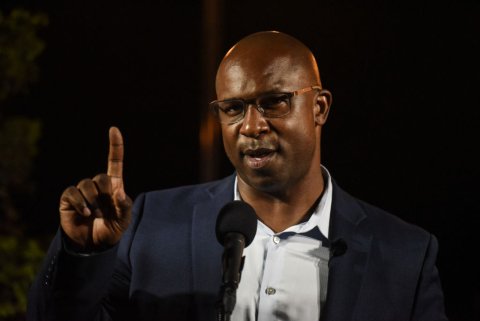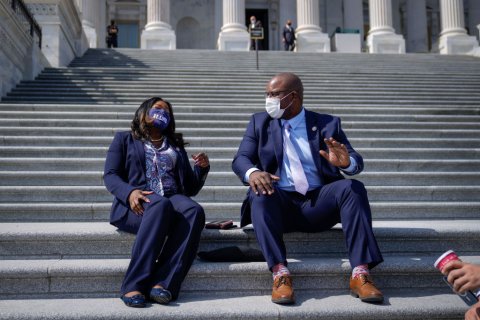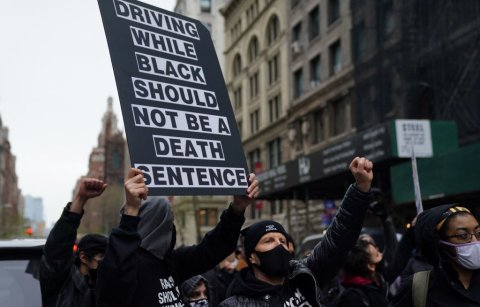Last year, Jamaal Bowman, a 45-year old former educator, unseated 16-term U.S. Representative Eliot Engel in the Democratic primary for New York's 16th District, which includes the northern Bronx and the southern portion of Westchester County. The district is so solidly Democratic that no Republican ran for the seat and Bowman easily crushed his Conservative Party opponent in the general election.
Bowman had been inspired by Representative Alexandria Ocasio-Cortez who had won her seat in New York's 14th district in 2018 in a similar upset.
Like Ocasio-Cortez, Bowman is a member of the nearly 100-member Congressional Progressive Caucus, part of "The Squad" (the informal group of Democratic congressional progressives which includes Ocasio-Cortez, Representatives Cori Bush of Missouri, Ilhan Omar of Minnesota, Ayanna Pressley of Massachusetts and Rashida Tlaib of Michigan). Also like Ocasio-Cortez, Bowman is a proud member of Democratic Socialists of America.
Newsweek spoke to him recently about his efforts to promote progressive causes in Congress. The interview was conducted before the verdict in the Derek Chauvin case, but just days after the fatal shooting of Daunte Wright in Minneapolis by a police officer. The interview has been edited for space and clarity.

You've been in Congress now for just over three months. How's it been so far and what have been some of the biggest surprises about the job?
Kinda feels like three years. [laughs] It's been great. It's really a blessing to be here. I worked in public education for 20 years, and I constantly looked outside of education at so many of the issues my students were going through and now being here in Congress I can fight for them, for justice with regard to those issues. We've been able to elevate conversations around white nationalism, white supremacy and law enforcement. We've been able to elevate the care economy, which is incredibly important to me personally. We've been able to elevate issues related to public education, issues related to broadband and access and equity when it comes to broadband. It's been great to work in collaboration with my colleagues around these issues and support the things they are fighting for, reauthorizing the Violence Against Women Act, supporting a pathway to citizenship for our immigrants, common sense gun laws. I guess what's most surprising, and I don't know if I'm that surprised by this, but I'm a progressive through and through, and my more moderate Democrat colleagues are really open to collaboration and working together, and really leaning in to progressive issues that matter most to my district.
You are one of just four Democratic Socialists of America members in the House. Do you coordinate with other members or with the DSA about strategy?
I'm in constant communication with DSA, both from the outside and members on the inside. The one I speak with the most is Congresswoman Ocasio-Cortez, speaking both formally and informally about policy and advocacy work. I think you may have seen, we came together in support of New York state organizers to push the governor to raise taxes on the wealthy. We're happy to see that that actually happened as part of the state budget. When you look at the care economy, when you look at broadband issues, when you look at what we're going to be rolling out soon related to the Green New Deal, for public schools, when you look at Medicare for All—all issues that we work on both the inside and outside with DSA members and organizers to push for in Congress.
You're also a member of the Congressional Progressive Caucus. Do you feel the caucus has been successful in pushing Congress and Biden further left?
Yes, I do. I feel that the White House and Congress are more progressive than they've ever been in this moment. I think it's because of the leadership—the work of Senator Bernie Sanders over the last several years. It's because of the leadership of Congresswoman Ocasio-Cortez, the rest of the Squad, [CPC Chair Representative] Pramila Jayapal, [Representative] Mark Pocan, [Representative] Katie Porter and many others. But it's also the work of organizers—you mentioned DSA is one, the Justice Democrats as well, the Sunrise Movement, groups throughout the country. Donald Trump was an awakening for the progressive movement to come together and organize and mobilize toward transformative change.

The term socialist is often weaponized by Republicans and some Democrats are very against identifying with it. How do you respond to that?
First of all, Martin Luther King Jr. identified as a socialist, and Fred Hampton identified as a socialist and so does Angela Davis. Whenever I can be mentioned in the same category as them, I'm exactly where I need to be...Yes we're fighting for justice, yes we're fighting for equity and racial equity, and yes we're fighting for human rights, but we're also fighting for the "beloved community"—a community of care, a community where we take care of ourselves and each other, the environment, our children, our seniors and those who are most vulnerable. We recognize that our system of capitalism is more harmful than helpful...it continues to allow wealth to be concentrated in the hands of a few, while the majority of Americans suffer. And by majority, I don't mean 51 percent, I mean the top one-tenth of 1 percent controlling more wealth than the bottom 90 percent of the country. That's just unheard of, and we have multinational corporations hiding taxes overseas, we have corporations here not paying any federal taxes, not contributing their fair share to our democracy and to our society. As a result of that system, we have incredible harm being done both to our school system, with mental health needs, to our housing, to our infrastructure needs, to our child care needs, lack of common sense gun laws. This system of accumulating capital by any means necessary is literally killing us and destroying the human race. We need something different, and to me that something different is the "beloved community." If that something different is also called socialism, then that's what I am. Sign me up.
There have been some calls from DSA activists and other leftists for the Squad and the Progressive Caucus to take a harder line, even threatening to withhold votes. Is that something you or other progressives might do?
Yes, and it's something that we speak about all the time. Those conversations are constantly happening, and yes, I see it as a strategy and when we collectively decide that we're going to use it, we will definitely use it. But...this is the most progressive Congress we've ever had, and the most progressive White House we've ever had. The American Rescue Plan is a clear example of that, and what's coming next, we believe, is going to be a further example of that as well.
You've spoken favorably about Biden. Are there areas where you're disappointed?
I speak favorably about Biden and the administration when necessary, and we criticize when necessary. Recently the killing of the young man Daunte Wright, you know the president responded to this by initially asking was this intentional or an accident and then communicating that he wanted to make sure that protests would be peaceful and that no property would be damaged. I immediately criticized him for valuing or speaking as if he were valuing private property over the life of a Black man, which happens way too often from moderates and conservatives in Congress and in the White House. That's one very direct criticism, and in other areas when we look at affordable housing, and the affordable housing plan as part of the next piece of this package, it doesn't go nearly far enough. In terms of what the country's affordable housing needs are—when you look at NYCHA [New York City Housing Authority], we need about 40 billion alone. So 30 billion overall for the country, is not going to be enough. And finally, we want Biden to be more green, and more ambitious with the green infrastructure push. This is our Green New Deal moment, this is our moment for a new 21st century economy, and we need to be bigger and bolder—creating that economy and aligning it with the American people and the demand of the American people and not bending over backwards to make moderates feel more comfortable. But just to be clear, I don't dwell on disappointment. Something happens, and I try to respond urgently and professionally and respectfully, but urgently, because the transformative needs that we have in our country are urgent.
Last year we saw Black Lives Matter protests around the world. Now we see, just a few miles away from where George Floyd was killed, another young Black man killed by police. What can Congress do and what actions does the administration need to take?
The House passed the George Floyd Justice in Policing Act, and there are many things about that act that are very good, and many things that we need to improve. But ending qualified immunity is a big deal, and part of that act, and it's something that we hope the Senate can take up and pass, which would lead to some really big changes with regard to law enforcement across the country. Our bill which looks at the connections between white nationalism organizations and individuals and Capitol Police, FBI, Department of Homeland Security and the Secret Service, is a big deal, and could be used as a model for police departments across the country to be analyzed by independent commissions.
Unfortunately, Daunte Wright was murdered a couple days ago, but there...has been a shift in the public consciousness in terms of how the public is responding to it. I don't think I've ever seen three professional sports teams cancel their games after Black men have been killed. Because of that, all of the sports networks have to lead with that story. It's bringing that issue to a wider audience that normally uses sports as an escape. But sports is not allowing the audience to use it as an escape any longer. If that's going to happen and if owners are going to cancel games it's going to force the sports industry to talk about it, and it's going to force fans who don't want to lean into this issue to begin to listen differently. The optimism is still there, but as you know, and I'll say this speaking for myself—every time a Black man is killed by the police I feel like a part of my soul dies, I feel like a piece of me dies. Every time this happens. It's sickening, it's tiring. It brings us to the brink of exhaustion, us meaning the Black community....My hope is through continued education, both in our school system and beyond, and through the continued organizing and urgent activist radical action from groups across the country that we see the transformative change we need, sooner rather than later. When I say sooner rather than later, I mean in one or two years, not 10 to 20 years.

You are introducing legislation regarding broadband access, which you mentioned earlier. Why do you think it's vital right now?
It's been vital for a number of years. We have millions of people across this country who don't have access to broadband and do not have access to Wi-Fi. This bill is about broadband justice, ensuring that we bring broadband to rural and urban communities across the country where they have utilities that are federally subsidized. It redefines broadband as a utility, and because it's federally subsidized, it provides it at little to no cost in rural and urban areas. This is obviously important now because of COVID and remote learning.
As a member of the House Education Committee, what steps do you think the country needs to take to help children who fell behind during the pandemic?
The American Rescue Plan took a big step by equitably distributing much-needed funds to our school districts and cities and counties and states, so that was a big deal. We needed the money and $130 billion to K–12 schools is just huge. School districts are going to be able to do a lot with that, so that was a key first step. The next step is making sure we hire more teachers, teacher's assistants, coaches, mentors and counselors, so that kids can get as much individualized and small group instruction and attention to help nurture any gaps that may have been created because of the pandemic. By gaps I mean both in terms of mental health, but also in terms of the cognitive, academic piece.









